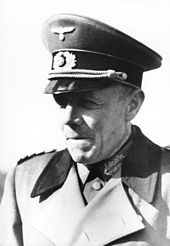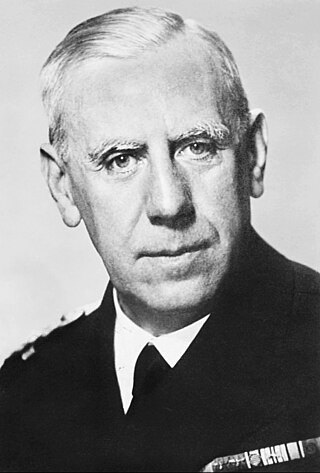
Wilhelm Franz Canaris was a German admiral and the chief of the Abwehr from 1935 to 1944. Initially a supporter of Adolf Hitler and the Nazi Party, Canaris turned against Hitler and committed acts of both passive and active resistance during World War II following the German invasion of Poland in 1939.

Hans Bernd Gisevius was a German diplomat and intelligence officer during the Second World War. A covert opponent of the Nazi regime, he served as a liaison in Zürich between Allen Dulles, station chief for the American OSS, and the German Resistance forces in Germany.

Ludwig August Theodor Beck was a German general and Chief of the German General Staff during the early years of the Nazi regime in Germany before World War II. Although Beck never became a member of the Nazi Party, in the early 1930s he supported Adolf Hitler's forceful denunciation of the Treaty of Versailles and the need to re-arm, although he believed Germany needed more time to rearm before starting a war.

Hans Paul Oster was a general in the Wehrmacht and a leading figure of the anti-Nazi German resistance from 1938 to 1943. As deputy head of the counter-espionage bureau in the Abwehr, Oster was in a good position to conduct resistance operations under the guise of intelligence work.
The Schwarze Kapelle was a term used by the Gestapo to refer to a group of conspirators in Nazi Germany, including many senior officers in the Wehrmacht, who plotted to overthrow Adolf Hitler. Unlike the Rote Kapelle, the name given by the Gestapo to the Soviet spy network in the Third Reich, many members of the Black Orchestra were of aristocratic background, felt contempt for the ideology of the Nazi Party, and were politically close to the Western Allies.

Ernst Heinrich Freiherr von Weizsäcker was a German naval officer, diplomat and politician. He served as State Secretary at the Foreign Office of Nazi Germany from 1938 to 1943, and as its Ambassador to the Holy See from 1943 to 1945. He was a member of the prominent Weizsäcker family, and the father of German President Richard von Weizsäcker and physicist and philosopher Carl Friedrich von Weizsäcker.

Hitler's Pope is a book published in 1999 by the British journalist and author John Cornwell that examines the actions of Eugenio Pacelli, who became Pope Pius XII, before and during the Nazi era, and explores the charge that he assisted in the legitimization of Adolf Hitler's Nazi regime in Germany, through the pursuit of a Reichskonkordat in 1933. The book is critical of Pius' conduct during the Second World War, arguing that he did not do enough, or speak out enough, against the Holocaust. Cornwell argues that Pius's entire career as the nuncio to Germany, Cardinal Secretary of State, and Pope, was characterized by a desire to increase and centralize the power of the Papacy, and that he subordinated opposition to the Nazis to that goal. He further argues that Pius was antisemitic and that this stance prevented him from caring about the European Jews.

Josef Müller, also known as "Ochsensepp", was a German politician. He was a member of the resistance during World War II and afterwards one of the founders of the Christian Social Union (CSU). He was a devout Catholic and a leading figure in the Catholic resistance to Hitler.
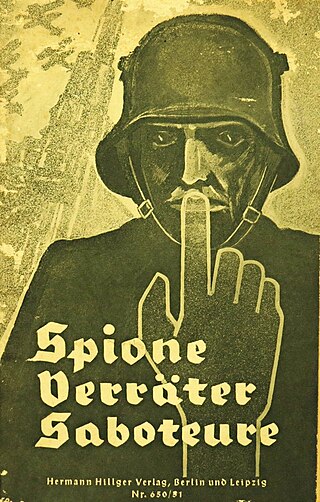
The German resistance to Nazism included unarmed and armed opposition and disobedience to the Nazi regime by various movements, groups and individuals by various means, from attempts to assassinate Adolf Hitler or to overthrow his regime, defection to the enemies of the Third Reich and sabotage against the German Army and the apparatus of repression and attempts to organize armed struggle, to open protests, rescue of persecuted persons, dissidence and "everyday resistance".

Robert Leiber, S.J. was a Jesuit priest from Germany, Professor for Church History at the Gregorian University in Rome from 1930 to 1960.
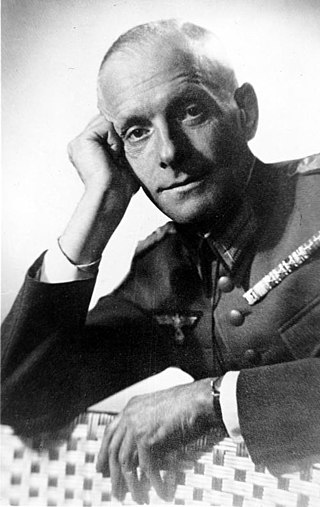
The Oster Conspiracy, also called the September Conspiracy, of 1938 was a proposed plan to overthrow German Führer Adolf Hitler and the Nazi regime if Germany went to war with Czechoslovakia over the Sudetenland. It was led by Generalmajor Hans Oster, deputy head of the Abwehr, and other high-ranking conservatives within the Wehrmacht who opposed the regime for behavior that was threatening to bring Germany into a war that they believed it was not ready to fight. They planned to overthrow Hitler and the Nazi regime through a storming of the Reich Chancellery by forces loyal to the plot to take control of the government, who would either arrest or assassinate Hitler, and restore the Monarchy under Prince Wilhelm of Prussia, the grandson of Wilhelm II.

The papacy of Pius XII began on 2 March 1939 and continued to 9 October 1958, covering the period of the Second World War and the Holocaust, during which millions of Jews were murdered by Adolf Hitler's Germany. Before becoming pope, Cardinal Pacelli served as a Vatican diplomat in Germany and as Vatican Secretary of State under Pius XI. His role during the Nazi period has been closely scrutinised and criticised. His supporters argue that Pius employed diplomacy to aid the victims of the Nazis during the war and, through directing his Church to provide discreet aid to Jews and others, saved hundreds of thousands of lives. Pius maintained links to the German Resistance, and shared intelligence with the Allies, but at the same time he developed alliances with Nazi Germany and Fascist Italy and even arranged secret negotiations with Hitler's envoys. His strongest public condemnation of genocide was, however, considered inadequate by the Allied Powers, while the Nazis viewed him as an Allied sympathizer who had dishonoured his policy of Vatican neutrality.

Vatican City pursued a policy of neutrality during World War II under the leadership of Pope Pius XII. Although the city of Rome was occupied by Germany from September 1943 and the Allies from June 1944, Vatican City itself was not occupied. The Vatican organised extensive humanitarian aid throughout the duration of the conflict.
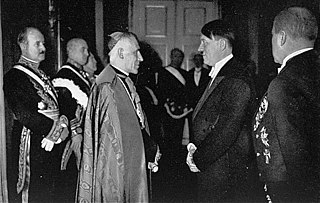
Popes Pius XI (1922–1939) and Pius XII (1939–1958) led the Catholic Church during the rise and fall of Nazi Germany. Around a third of Germans were Catholic in the 1930s, most of them lived in Southern Germany; Protestants dominated the north. The Catholic Church in Germany opposed the Nazi Party, and in the 1933 elections, the proportion of Catholics who voted for the Nazi Party was lower than the national average. Nevertheless, the Catholic-aligned Centre Party voted for the Enabling Act of 1933, which gave Adolf Hitler additional domestic powers to suppress political opponents as Chancellor of Germany. President Paul Von Hindenburg continued to serve as Commander and Chief and he also continued to be responsible for the negotiation of international treaties until his death on 2 August 1934.
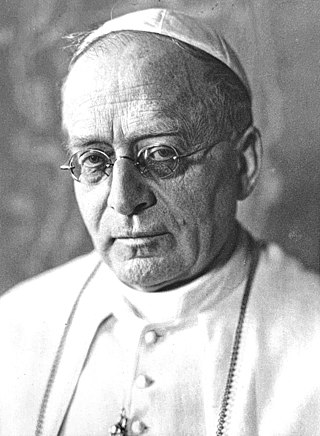
During the pontificate of Pope Pius XI (1922–1939), the Weimar Republic transitioned into Nazi Germany. In 1933, the ailing President von Hindenburg appointed Adolf Hitler as Chancellor of Germany in a Coalition Cabinet, and the Holy See concluded the Reich concordat treaty with the still nominally functioning Weimar state later that year. Hoping to secure the rights of the Church in Germany, the Church agreed to a requirement that clergy cease to participate in politics. The Hitler regime routinely violated the treaty, and launched a persecution of the Catholic Church in Germany.
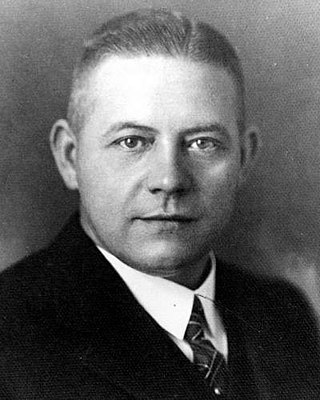
Werner Schrader was a German military officer involved in several plots by the German Resistance including the famous 20 July plot, a coup d'état attempting to assassinate Adolf Hitler.

Lothar König (1906–1946) was a German Jesuit priest and member of the Kreisau Circle of the German Resistance during the Nazi period. Though multi-denominational, the Kreisau group's opposition to the Hitler regime had a strongly Christian orientation, and looked for a general Christian revival, and reawakening of awareness of the transcendental. Its outlook was rooted both in German romantic and idealist tradition and in the Catholic doctrine of natural law. König would become an important intermediary between the Circle and bishops Grober of Freiberg and Preysing of Berlin.

Catholic resistance to Nazi Germany was a component of German resistance to Nazism and of Resistance during World War II. The role of the Catholic Church during the Nazi years remains a matter of much contention. From the outset of Nazi rule in 1933, issues emerged which brought the church into conflict with the regime and persecution of the church led Pope Pius XI to denounce the policies of the Nazi Government in the 1937 papal encyclical Mit brennender Sorge. His successor Pius XII faced the war years and provided intelligence to the Allies. Catholics fought on both sides in World War II and neither the Catholic nor Protestant churches as institutions were prepared to openly oppose the Nazi State.

At the outbreak of World War II, the Society of Jesus (Jesuits) had some 1700 members in Nazi Germany, divided into three provinces: Eastern, Lower and Upper Germany. Nazi leaders had some admiration for the discipline of the Jesuit order, but opposed its principles. Of the 152 Jesuits murdered by the Nazis across Europe, 27 died in captivity or its results, and 43 in the concentration camps.

Helmuth Groscurth was a German staff and Abwehr officer in the Wehrmacht and a member of the German resistance. As an intelligence officer he was an early proponent of the Brandenburgers, commanded unconventional warfare operations in the Sudetenland, and was an active conspirator against Hitler's agenda. He was later reassigned to the regular army following his criticism of war crimes committed by German forces in Poland. After commanding an infantry battalion in the invasion of France he assumed a variety of staff roles. He was involved in the events of the Bila Tserkva massacre where he attempted to avert the killing of Jewish children.


